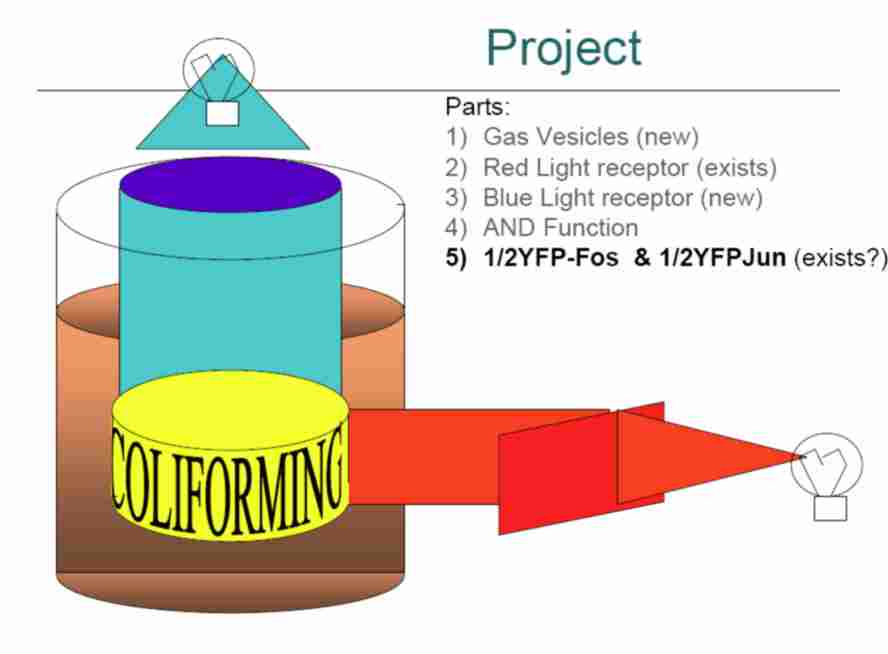Melbourne/Melbourne overview
From 2007.igem.org
m |
|||
| (One intermediate revision not shown) | |||
| Line 1: | Line 1: | ||
The formation of complex scaffolds of extracellular matrix is one of the problems facing the emerging discipline of tissue engineering[1]. One way to produce such scaffolds would be to have them secreeted by cells joined together in a three dimensional structure. | The formation of complex scaffolds of extracellular matrix is one of the problems facing the emerging discipline of tissue engineering[1]. One way to produce such scaffolds would be to have them secreeted by cells joined together in a three dimensional structure. | ||
| - | We concieved the idea of using two light sources of different wavelength, impinging on a suspension of cells from differnt directions to induce the cells at their intersection to join to each other and thus create a three dimensional structure. Since we plan to implement the system in ''Ecoli'' we called it coliforming. Implementation of this concept requires two new biobricks of more general application and these are the focus of this | + | We concieved the idea of using two light sources of different wavelength, impinging on a suspension of cells from differnt directions to induce the cells at their intersection to join to each other and thus create a three dimensional structure. Since we plan to implement the system in ''Ecoli'' we called it coliforming. Implementation of this concept requires two new biobricks of more general application and these are the focus of this year's submission to the Igem competition. |
# A new light receptor like the Red light receptor, but sensitive to a different wavelength. This is being developed based on work in the Spudich lab with Sensory RhodopsinII [2] and by Alan Grossman with ComP (kinase), ComA(target) and PsfA(promotor) two component signalling system[3]. Implementation is by dirrect sythesis of the required fusion genes, using the Geneart offer. | # A new light receptor like the Red light receptor, but sensitive to a different wavelength. This is being developed based on work in the Spudich lab with Sensory RhodopsinII [2] and by Alan Grossman with ComP (kinase), ComA(target) and PsfA(promotor) two component signalling system[3]. Implementation is by dirrect sythesis of the required fusion genes, using the Geneart offer. | ||
| - | # A protein generator for gas vesicles to make the suspension of cells neutrally bouyant. This is based on the work in the Cannon lab[4]. Implemenation is by removal of restriction sites using site dirrected mutagenesis of Maura's plasmid and PCR primer based engineering of biobrick prefix and suffix. | + | # A protein generator for gas vesicles to make the suspension of cells neutrally bouyant. This is based on the work in the Cannon lab[4]. Implemenation is by removal of restriction sites using site dirrected mutagenesis of Maura Cannon's plasmid and PCR primer based engineering of biobrick prefix and suffix. |
[[image:Melbourne overvie slide.jpg|400px]] | [[image:Melbourne overvie slide.jpg|400px]] | ||
Latest revision as of 03:26, 25 October 2007
The formation of complex scaffolds of extracellular matrix is one of the problems facing the emerging discipline of tissue engineering[1]. One way to produce such scaffolds would be to have them secreeted by cells joined together in a three dimensional structure.
We concieved the idea of using two light sources of different wavelength, impinging on a suspension of cells from differnt directions to induce the cells at their intersection to join to each other and thus create a three dimensional structure. Since we plan to implement the system in Ecoli we called it coliforming. Implementation of this concept requires two new biobricks of more general application and these are the focus of this year's submission to the Igem competition.
- A new light receptor like the Red light receptor, but sensitive to a different wavelength. This is being developed based on work in the Spudich lab with Sensory RhodopsinII [2] and by Alan Grossman with ComP (kinase), ComA(target) and PsfA(promotor) two component signalling system[3]. Implementation is by dirrect sythesis of the required fusion genes, using the Geneart offer.
- A protein generator for gas vesicles to make the suspension of cells neutrally bouyant. This is based on the work in the Cannon lab[4]. Implemenation is by removal of restriction sites using site dirrected mutagenesis of Maura Cannon's plasmid and PCR primer based engineering of biobrick prefix and suffix.
References:
- Raghunath, J., et al., Biomaterials and scaffold design: key to tissue-engineering cartilage. Biotechnology and Applied Biochemistry, 2007. 46: p. 73-84.
- Vishwa D. Trivedi and John L. Spudich, Photostimulation of a Sensory Rhodopsin II/HtrII/Tsr Fusion Chimera Activates CheA-Autophosphorylation and CheY-Phosphotransfer in Vitro. Biochemistry 2003, 42, 13887-13892.
- Comella, N. and A.D. Grossman, Conservation of genes and processes controlled by the quorum response in bacteria: characterization of genes controlled by the quorum-sensing transcription factor ComA in Bacillus subtilis. Molecular Microbiology, 2005. 57(4): p. 1159-1174.
- Li, N. and M.C. Cannon, Gas vesicle genes identified in Bacillus megaterium and functional expression in Escherichia coli. Journal of Bacteriology, 1998. 180(9): p. 2450-2458.
